DEFEDE / Miami Paper Fires Columnist, Adding Own Twist to Tale of Sex, Politics and Suicide
ABBY GOODNOUGH The New York Times
MIAMI - It seemed like a throwback to "Miami Vice": an eccentric politician, recently accused of money laundering and soliciting male prostitutes, fatally shoots himself in the lobby of The Miami Herald after an anguished phone conversation with a star columnist.
But the storyline grew even stranger on Thursday as employees of the newspaper reacted with outrage after learning that the columnist, Jim DeFede, had been fired for secretly taping his conversation with the distraught man - a possible violation of state law.
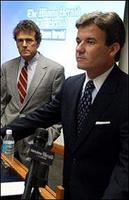 Mr. DeFede, who chronicles the surreal politics of South Florida, said his conversation with the man, Arthur Teele Jr., a former city commissioner recently indicted on federal charges of mail fraud, wire fraud and money laundering, was so disturbing that he quietly began recording it "out of concern" for Mr. Teele.
Mr. DeFede, who chronicles the surreal politics of South Florida, said his conversation with the man, Arthur Teele Jr., a former city commissioner recently indicted on federal charges of mail fraud, wire fraud and money laundering, was so disturbing that he quietly began recording it "out of concern" for Mr. Teele.
"The idea that he might be thinking suicide was in my mind," Mr. DeFede, 42, said Thursday. "I wanted to get what he was saying down - to preserve what he was saying - so I pushed the record button."
Mr. Teele's suicide followed a police investigation into corruption that, together with his death on the polished terrazzo floor of The Herald building's lobby on Wednesday, provided yet another strange chapter in Miami's storied political history.
Because he made a recording without Mr. Teele's knowledge - a crime in Florida, unlike many other states - and because he told his bosses he had done so, Mr. DeFede, a three-year employee of The Herald, was abruptly fired Wednesday night. Now many of his colleagues are stunned. The newspaper's management is staunchly defending its action, and Mr. DeFede's dismissal is making waves as a stark example of the extreme measures by newspapers to appear beyond ethical reproach.
Orville Schell, the dean of the University of California Graduate School of Journalism, said Mr. DeFede's actions might not have elicited such a quick, sharp reaction in the past.
"Usually, somebody who had done an infraction like that and admitted it, they might have just said, 'Don't do it again,' " Mr. Schell said. "But I think in the present climate, where no media outlet feels it can sustain another hit, they're reacting with incredible rigidity and very punctiliously. Every media outlet now is bending over backwards to prove its fidelity to the higher principles to the trade."
Mr. DeFede and his former employer have differing accounts of how his dismissal unfolded in the fraught hours after Mr. Teele's death. Mr. DeFede, a muckraker with a knack for nailing wayward politicians, said Jesús Díaz Jr., The Herald's publisher, and Robert Beatty, its general counsel, were initially supportive when he told them about taping Mr. Teele.
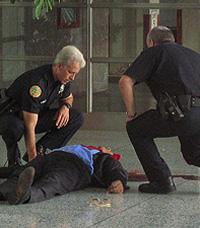 "Robert said, 'There may be some liability here, but The Herald would defend you,' " Mr. DeFede said in a phone interview. "And Jesús said, 'Absolutely.' "
"Robert said, 'There may be some liability here, but The Herald would defend you,' " Mr. DeFede said in a phone interview. "And Jesús said, 'Absolutely.' "
Several hours later, around 10:30 p.m., Mr. DeFede said, he was summoned to Mr. Díaz's office and told he was being fired.
In a news conference at The Herald on Thursday, Mr. Díaz said: "We never said that this was not an issue, that this would be O.K. So there was no change. This was an issue from the moment we heard what Jim had done."
Mr. Teele's suicide came on the same day that another newspaper, Miami New Times, published a compilation of excerpts from a recent investigative report on him by the Miami-Dade Police Department. Among the many sordid details was a detective's interview with a male prostitute, now in jail, who said Mr. Teele had paid him for sex and used cocaine with him.
Mr. DeFede said Mr. Teele, 59, did not mention the article during their late-afternoon conversation but talked in anguish about the prostitute's accusations, saying he was especially worried about the impact on his adult son. Mr. DeFede said he had considered Mr. Teele a friend for most of the 14 years he had known him, and that it was not uncommon for Mr. Teele to "just call me out of the blue and want to talk and vent." But something was different this time, he said.
"I realized Art was headed in a direction that scared me," Mr. DeFede said, and so in the heat of the moment he turned on his tape recorder. Mr. Teele seemed more stable when they hung up after 25 minutes, Mr. DeFede said, and even calmer when he called a second time from The Herald's lobby. Mr. DeFede was working at home, and Mr. Teele said he was leaving a packet for him at the security desk.
The Herald called minutes later to inform him of the shooting.
"I'm stunned, I'm physically shaking," Mr. DeFede recalled. "And my first reaction, looking down at the tape, is this is basically Teele's suicide note. These are his final words about the torture that his life has been through all this up and down. This is his last words; what do I do with it?"
 After talking to a Herald reporter who wanted to interview him for an article about the shooting, Mr. DeFede was transferred to Mr. Díaz and Mr. Beatty, whom he told about the tape. With their permission, Mr. DeFede said, he transcribed it before bringing it to The Herald building and sitting down to write about the conversation. He was fired hours later. Even after knowing Mr. DeFede had taped Mr. Teele without his consent, the newspaper published portions of the conversation as described by Mr. DeFede.
After talking to a Herald reporter who wanted to interview him for an article about the shooting, Mr. DeFede was transferred to Mr. Díaz and Mr. Beatty, whom he told about the tape. With their permission, Mr. DeFede said, he transcribed it before bringing it to The Herald building and sitting down to write about the conversation. He was fired hours later. Even after knowing Mr. DeFede had taped Mr. Teele without his consent, the newspaper published portions of the conversation as described by Mr. DeFede.
Tom Fiedler, the paper's executive editor, said the decision was wrenching but that he, like Mr. Díaz, saw no choice.
"We expect our people to act in a highly ethical way, and Jim admitted that he had crossed that line, and I really didn't see an alternative," Mr. Fiedler said. "If we have that expectation and someone fails to abide by it, knowingly fails to abide by it, regardless of that person's talent it means they can no longer be a part of The Herald."
Though some Herald employees speculated that Knight Ridder, the newspaper's parent company, might have influenced Herald executives, a spokeswoman for Knight Ridder said The Herald made the decision to fire Mr. DeFede on its own.
Mr. Diaz said he would not turn the tape over to the police or prosecutors because Mr. Teele believed his conversation with Mr. DeFede was off the record. The Miami-Dade Police Department and the Miami-Dade state attorney's office said they had not yet considered whether to bring charges against Mr. DeFede.
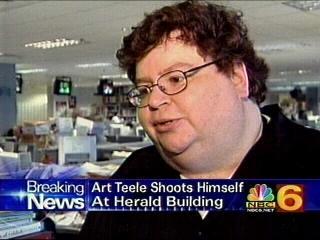 The law that Mr. DeFede may have broken is murky - even his bosses said it was not clear whether he had violated it. It states that "all parties must consent to the recording or disclosure of the contents of any wire, oral or electronic communication" in Florida. But a federal appeals court found in 1991 that for business calls, recording on the phone without the other party's consent was not illegal.
The law that Mr. DeFede may have broken is murky - even his bosses said it was not clear whether he had violated it. It states that "all parties must consent to the recording or disclosure of the contents of any wire, oral or electronic communication" in Florida. But a federal appeals court found in 1991 that for business calls, recording on the phone without the other party's consent was not illegal.
Lucy Dalglish, executive director of the Reporters Committee For Freedom of the Press in Arlington, Va., said Mr. DeFede might have a good case in court but The Herald still had the right to fire him.
Reporters who attended a staff meeting about the firing said many were livid that it had happened so quickly - even as Mr. Teele's blood was still being removed from the building's lobby - and felt that Mr. DeFede had been too harshly punished, though some believed what he did was ethically questionable.
Mr. Fiedler said he and Mr. Díaz considered other options, like suspending Mr. DeFede, but because he "clearly understood" the law they had to go further. In a staff meeting, Mr. Fiedler said Mr. DeFede had violated a "basic tenet" of Herald policy.
Mr. DeFede said he still hoped The Herald might reconsider. "There's a dangerous, dangerous trend here of any journalist who makes any kind of mistake is automatically killed," Mr. DeFede said. "I love working at The Miami Herald. I hope that as things settle down and we can all be a little less emotional about what occurred, we can step back and look at things in a calmer way."
Louise Story contributed reporting from New York for this article.
MIAMI - It seemed like a throwback to "Miami Vice": an eccentric politician, recently accused of money laundering and soliciting male prostitutes, fatally shoots himself in the lobby of The Miami Herald after an anguished phone conversation with a star columnist.
But the storyline grew even stranger on Thursday as employees of the newspaper reacted with outrage after learning that the columnist, Jim DeFede, had been fired for secretly taping his conversation with the distraught man - a possible violation of state law.
 Mr. DeFede, who chronicles the surreal politics of South Florida, said his conversation with the man, Arthur Teele Jr., a former city commissioner recently indicted on federal charges of mail fraud, wire fraud and money laundering, was so disturbing that he quietly began recording it "out of concern" for Mr. Teele.
Mr. DeFede, who chronicles the surreal politics of South Florida, said his conversation with the man, Arthur Teele Jr., a former city commissioner recently indicted on federal charges of mail fraud, wire fraud and money laundering, was so disturbing that he quietly began recording it "out of concern" for Mr. Teele."The idea that he might be thinking suicide was in my mind," Mr. DeFede, 42, said Thursday. "I wanted to get what he was saying down - to preserve what he was saying - so I pushed the record button."
Mr. Teele's suicide followed a police investigation into corruption that, together with his death on the polished terrazzo floor of The Herald building's lobby on Wednesday, provided yet another strange chapter in Miami's storied political history.
Because he made a recording without Mr. Teele's knowledge - a crime in Florida, unlike many other states - and because he told his bosses he had done so, Mr. DeFede, a three-year employee of The Herald, was abruptly fired Wednesday night. Now many of his colleagues are stunned. The newspaper's management is staunchly defending its action, and Mr. DeFede's dismissal is making waves as a stark example of the extreme measures by newspapers to appear beyond ethical reproach.
Orville Schell, the dean of the University of California Graduate School of Journalism, said Mr. DeFede's actions might not have elicited such a quick, sharp reaction in the past.
"Usually, somebody who had done an infraction like that and admitted it, they might have just said, 'Don't do it again,' " Mr. Schell said. "But I think in the present climate, where no media outlet feels it can sustain another hit, they're reacting with incredible rigidity and very punctiliously. Every media outlet now is bending over backwards to prove its fidelity to the higher principles to the trade."
Mr. DeFede and his former employer have differing accounts of how his dismissal unfolded in the fraught hours after Mr. Teele's death. Mr. DeFede, a muckraker with a knack for nailing wayward politicians, said Jesús Díaz Jr., The Herald's publisher, and Robert Beatty, its general counsel, were initially supportive when he told them about taping Mr. Teele.
 "Robert said, 'There may be some liability here, but The Herald would defend you,' " Mr. DeFede said in a phone interview. "And Jesús said, 'Absolutely.' "
"Robert said, 'There may be some liability here, but The Herald would defend you,' " Mr. DeFede said in a phone interview. "And Jesús said, 'Absolutely.' "Several hours later, around 10:30 p.m., Mr. DeFede said, he was summoned to Mr. Díaz's office and told he was being fired.
In a news conference at The Herald on Thursday, Mr. Díaz said: "We never said that this was not an issue, that this would be O.K. So there was no change. This was an issue from the moment we heard what Jim had done."
Mr. Teele's suicide came on the same day that another newspaper, Miami New Times, published a compilation of excerpts from a recent investigative report on him by the Miami-Dade Police Department. Among the many sordid details was a detective's interview with a male prostitute, now in jail, who said Mr. Teele had paid him for sex and used cocaine with him.
Mr. DeFede said Mr. Teele, 59, did not mention the article during their late-afternoon conversation but talked in anguish about the prostitute's accusations, saying he was especially worried about the impact on his adult son. Mr. DeFede said he had considered Mr. Teele a friend for most of the 14 years he had known him, and that it was not uncommon for Mr. Teele to "just call me out of the blue and want to talk and vent." But something was different this time, he said.
"I realized Art was headed in a direction that scared me," Mr. DeFede said, and so in the heat of the moment he turned on his tape recorder. Mr. Teele seemed more stable when they hung up after 25 minutes, Mr. DeFede said, and even calmer when he called a second time from The Herald's lobby. Mr. DeFede was working at home, and Mr. Teele said he was leaving a packet for him at the security desk.
The Herald called minutes later to inform him of the shooting.
"I'm stunned, I'm physically shaking," Mr. DeFede recalled. "And my first reaction, looking down at the tape, is this is basically Teele's suicide note. These are his final words about the torture that his life has been through all this up and down. This is his last words; what do I do with it?"
 After talking to a Herald reporter who wanted to interview him for an article about the shooting, Mr. DeFede was transferred to Mr. Díaz and Mr. Beatty, whom he told about the tape. With their permission, Mr. DeFede said, he transcribed it before bringing it to The Herald building and sitting down to write about the conversation. He was fired hours later. Even after knowing Mr. DeFede had taped Mr. Teele without his consent, the newspaper published portions of the conversation as described by Mr. DeFede.
After talking to a Herald reporter who wanted to interview him for an article about the shooting, Mr. DeFede was transferred to Mr. Díaz and Mr. Beatty, whom he told about the tape. With their permission, Mr. DeFede said, he transcribed it before bringing it to The Herald building and sitting down to write about the conversation. He was fired hours later. Even after knowing Mr. DeFede had taped Mr. Teele without his consent, the newspaper published portions of the conversation as described by Mr. DeFede.Tom Fiedler, the paper's executive editor, said the decision was wrenching but that he, like Mr. Díaz, saw no choice.
"We expect our people to act in a highly ethical way, and Jim admitted that he had crossed that line, and I really didn't see an alternative," Mr. Fiedler said. "If we have that expectation and someone fails to abide by it, knowingly fails to abide by it, regardless of that person's talent it means they can no longer be a part of The Herald."
Though some Herald employees speculated that Knight Ridder, the newspaper's parent company, might have influenced Herald executives, a spokeswoman for Knight Ridder said The Herald made the decision to fire Mr. DeFede on its own.
Mr. Diaz said he would not turn the tape over to the police or prosecutors because Mr. Teele believed his conversation with Mr. DeFede was off the record. The Miami-Dade Police Department and the Miami-Dade state attorney's office said they had not yet considered whether to bring charges against Mr. DeFede.
 The law that Mr. DeFede may have broken is murky - even his bosses said it was not clear whether he had violated it. It states that "all parties must consent to the recording or disclosure of the contents of any wire, oral or electronic communication" in Florida. But a federal appeals court found in 1991 that for business calls, recording on the phone without the other party's consent was not illegal.
The law that Mr. DeFede may have broken is murky - even his bosses said it was not clear whether he had violated it. It states that "all parties must consent to the recording or disclosure of the contents of any wire, oral or electronic communication" in Florida. But a federal appeals court found in 1991 that for business calls, recording on the phone without the other party's consent was not illegal.Lucy Dalglish, executive director of the Reporters Committee For Freedom of the Press in Arlington, Va., said Mr. DeFede might have a good case in court but The Herald still had the right to fire him.
Reporters who attended a staff meeting about the firing said many were livid that it had happened so quickly - even as Mr. Teele's blood was still being removed from the building's lobby - and felt that Mr. DeFede had been too harshly punished, though some believed what he did was ethically questionable.
Mr. Fiedler said he and Mr. Díaz considered other options, like suspending Mr. DeFede, but because he "clearly understood" the law they had to go further. In a staff meeting, Mr. Fiedler said Mr. DeFede had violated a "basic tenet" of Herald policy.
Mr. DeFede said he still hoped The Herald might reconsider. "There's a dangerous, dangerous trend here of any journalist who makes any kind of mistake is automatically killed," Mr. DeFede said. "I love working at The Miami Herald. I hope that as things settle down and we can all be a little less emotional about what occurred, we can step back and look at things in a calmer way."
Louise Story contributed reporting from New York for this article.
CBS4 video: Jim DeFede talks to the media also see NBC 6
Letters from The Miami Herald readers
Herald bosses: Columnist violated ethical standards
Video: Herald execs news conference
Suicide's Aftermath Rocks Miami
Manuel Roig-Franzia Washington Post
MIAMI - The flamboyant politician is dead in the most flamboyant of ways. The muckraking columnist is out of a job. The newsroom is in an uproar, and so are many in the community.
This city with its well-refined appetite for the bizarre has been riveted to the splashy parallel melodramas unspooling in the hours since Arthur E. Teele Jr., a spectacularly skilled and spectacularly flawed Florida political legend, shot himself to death Wednesday in the Miami Herald lobby.
The public death of Teele -- a former city and county commissioner who made the runoff in the 1996 mayoral election and was active in civil rights causes -- cuts a hole in a huge corruption case, rich with allegations of shopping bags stuffed with bribe money and seedy backroom dealing. But the suicide has also touched off a journalistic firestorm, with outraged reporters here and elsewhere lashing out at Herald executives and the newspaper's parent company, Knight Ridder, for the late-night firing of star columnist Jim DeFede, the writer Teele contacted just before he took his own life.
 Jesus Diaz, right, publisher of The Miami Herald, explains the newspaper's position regarding Wednesday's firing of columnist Jim DeFede, Thursday, July 28, 2005, during a meeting of newsroom employees in Miami. Listening at left is Herald Executive Editor Tom Fiedler. The firing came in the wake of Former City Commissioner Arthur E. Teele Jr. fatally shooting himself Wednesday in the lobby of The Miami Herald building. (AP Photo/Miami Herald, Peter Andrew Bosch)
Jesus Diaz, right, publisher of The Miami Herald, explains the newspaper's position regarding Wednesday's firing of columnist Jim DeFede, Thursday, July 28, 2005, during a meeting of newsroom employees in Miami. Listening at left is Herald Executive Editor Tom Fiedler. The firing came in the wake of Former City Commissioner Arthur E. Teele Jr. fatally shooting himself Wednesday in the lobby of The Miami Herald building. (AP Photo/Miami Herald, Peter Andrew Bosch)
DeFede, as recognizable for his Hitchcockian silhouette as for his habit of pricking the powerful, was dismissed because he had taped phone conversations with Teele without consent, a possible violation of Florida law. But the timing of the firing -- word leaked around 11 p.m. Wednesday, five hours or so after the suicide -- angered many colleagues who said DeFede should face no more than a suspension.
DeFede voluntarily told the Herald about the taping, but not before being assured by one of the paper's lawyers, Robert Beatty, and by Publisher Jesus Diaz that he had attorney-client privilege, DeFede said in an interview Thursday night. "The Herald will support you," DeFede said he was told by Beatty.
"I trusted my employer to stand by me," DeFede said. "Suddenly, I'm out on the street. . . . To just sort of throw me out and label me a disgraced journalist is over the top."
Herald reporters and editors packed a conference room Thursday and broke into sustained applause when a reporter urged Diaz to reconsider the firing, several Herald reporters who attended said. His response was an unequivocal "no."
"It's sad," said novelist and Herald columnist Carl Hiaasen. "He was a bright spot on that Metro page, a desperately needed voice."
Some current and former Herald staffers accused the Herald and Knight Ridder of using the Teele tragedy to silence a nettlesome critic. A Web site launched to urge DeFede's rehiring crashed briefly after being overwhelmed with hits Thursday. The site -- which includes a petition signed by journalists such as humorist Dave Barry -- was set up by former Herald staffers Peter Wallsten, now a White House correspondent for the Los Angeles Times, and Charles Savage, now a Washington correspondent for the Boston Globe.
"We are concerned that Jim's willingness in the past to offend powerful figures in Miami and, at times, his own employers, may have contributed to the hasty decision to fire him," Wallsten and Savage wrote.
DeFede's firing compounded the controversies enveloping a newspaper that many believe has plummeted in quality since its 1980s heyday amid efforts by Knight Ridder to boost profit margins. Rep. Alcee L. Hastings (D-Fla.) accused the paper of "sensationalism" in publishing a front-page photo of Teele with blood pooling around his head.
From inside the newspaper, DeFede became one of its most stinging critics, once skewering the Herald for providing free advertising to the Free Trade Area of the Americas organization before a meeting that drew thousands of protesters to downtown Miami. DeFede had also needled Knight Ridder in characteristically acid style in one of his first columns at the Herald. After detailing millions of dollars in bonuses given to Knight Ridder Chairman Anthony P. Ridder and others, he wrote that Herald journalists who spent a Saturday reporting about the space shuttle Columbia explosion got "free pizza."
 Shortly thereafter, Herald Executive Editor Tom Fiedler wrote a column saying "Jim's swat at Knight Ridder's drive for profits was cheap and easy -- but also misguided."
Shortly thereafter, Herald Executive Editor Tom Fiedler wrote a column saying "Jim's swat at Knight Ridder's drive for profits was cheap and easy -- but also misguided."
At a news conference Wednesday, Fiedler initially described DeFede's taping as a "potential" violation of Florida law. Later in the news conference, he said he fired the columnist because of the paper's "bright line" on illegal activity and "clear understanding" that the law was violated. DeFede's tapes -- containing some of Teele's final words -- may never get a full public airing, adding more intrigue. Diaz said the paper would not give the tapes to law enforcement or publish anything beyond the snippets in Thursday's articles.
But in an interview late Thursday, DeFede recounted a rambling conversation with a distraught man he described as "a friend." DeFede said he feared for Teele's safety and turned on a recorder because he wanted a record of what he called "an incredible moment." "I'm dead in the water. I'm dead in the water," DeFede said Teele told him while complaining about mounting legal defense costs.
One of the last acts by Teele -- a consummate insider source -- may have been dropping off information about a case that DeFede, whom he trusted, needed for a story. Teele called DeFede from the Herald lobby but assured him there was no rush to collect the package. "He laughed," DeFede recalled, "and said, 'It can wait until tomorrow.' " Seconds later, Teele shot himself.
When Herald executives told DeFede about the shooting, he said, his hands were trembling. For the first time, he realized he held "Art Teele's suicide note."
The man who spoke some of his last words to a columnist defied conventions, alternating between temperamental and cerebral. Teele, 59, was a popular black politician who chose the GOP, a master tactician undone by informants who accused him of baldly extorting bribes, soliciting male prostitutes and snorting cocaine. Associates of Teele's say he learned before his death that the weekly Miami New Times would publish a lengthy police report on Thursday detailing allegations made by jailed prostitutes and others.
DeFede was interrupted while finishing his own piece about Teele for Thursday's paper -- his bosses had come to let him go, though he says they made him wait 20 minutes out in the hallway before saying so. His column never ran.
This city with its well-refined appetite for the bizarre has been riveted to the splashy parallel melodramas unspooling in the hours since Arthur E. Teele Jr., a spectacularly skilled and spectacularly flawed Florida political legend, shot himself to death Wednesday in the Miami Herald lobby.
The public death of Teele -- a former city and county commissioner who made the runoff in the 1996 mayoral election and was active in civil rights causes -- cuts a hole in a huge corruption case, rich with allegations of shopping bags stuffed with bribe money and seedy backroom dealing. But the suicide has also touched off a journalistic firestorm, with outraged reporters here and elsewhere lashing out at Herald executives and the newspaper's parent company, Knight Ridder, for the late-night firing of star columnist Jim DeFede, the writer Teele contacted just before he took his own life.
 Jesus Diaz, right, publisher of The Miami Herald, explains the newspaper's position regarding Wednesday's firing of columnist Jim DeFede, Thursday, July 28, 2005, during a meeting of newsroom employees in Miami. Listening at left is Herald Executive Editor Tom Fiedler. The firing came in the wake of Former City Commissioner Arthur E. Teele Jr. fatally shooting himself Wednesday in the lobby of The Miami Herald building. (AP Photo/Miami Herald, Peter Andrew Bosch)
Jesus Diaz, right, publisher of The Miami Herald, explains the newspaper's position regarding Wednesday's firing of columnist Jim DeFede, Thursday, July 28, 2005, during a meeting of newsroom employees in Miami. Listening at left is Herald Executive Editor Tom Fiedler. The firing came in the wake of Former City Commissioner Arthur E. Teele Jr. fatally shooting himself Wednesday in the lobby of The Miami Herald building. (AP Photo/Miami Herald, Peter Andrew Bosch)DeFede, as recognizable for his Hitchcockian silhouette as for his habit of pricking the powerful, was dismissed because he had taped phone conversations with Teele without consent, a possible violation of Florida law. But the timing of the firing -- word leaked around 11 p.m. Wednesday, five hours or so after the suicide -- angered many colleagues who said DeFede should face no more than a suspension.
DeFede voluntarily told the Herald about the taping, but not before being assured by one of the paper's lawyers, Robert Beatty, and by Publisher Jesus Diaz that he had attorney-client privilege, DeFede said in an interview Thursday night. "The Herald will support you," DeFede said he was told by Beatty.
"I trusted my employer to stand by me," DeFede said. "Suddenly, I'm out on the street. . . . To just sort of throw me out and label me a disgraced journalist is over the top."
Herald reporters and editors packed a conference room Thursday and broke into sustained applause when a reporter urged Diaz to reconsider the firing, several Herald reporters who attended said. His response was an unequivocal "no."
"It's sad," said novelist and Herald columnist Carl Hiaasen. "He was a bright spot on that Metro page, a desperately needed voice."
Some current and former Herald staffers accused the Herald and Knight Ridder of using the Teele tragedy to silence a nettlesome critic. A Web site launched to urge DeFede's rehiring crashed briefly after being overwhelmed with hits Thursday. The site -- which includes a petition signed by journalists such as humorist Dave Barry -- was set up by former Herald staffers Peter Wallsten, now a White House correspondent for the Los Angeles Times, and Charles Savage, now a Washington correspondent for the Boston Globe.
"We are concerned that Jim's willingness in the past to offend powerful figures in Miami and, at times, his own employers, may have contributed to the hasty decision to fire him," Wallsten and Savage wrote.
DeFede's firing compounded the controversies enveloping a newspaper that many believe has plummeted in quality since its 1980s heyday amid efforts by Knight Ridder to boost profit margins. Rep. Alcee L. Hastings (D-Fla.) accused the paper of "sensationalism" in publishing a front-page photo of Teele with blood pooling around his head.
From inside the newspaper, DeFede became one of its most stinging critics, once skewering the Herald for providing free advertising to the Free Trade Area of the Americas organization before a meeting that drew thousands of protesters to downtown Miami. DeFede had also needled Knight Ridder in characteristically acid style in one of his first columns at the Herald. After detailing millions of dollars in bonuses given to Knight Ridder Chairman Anthony P. Ridder and others, he wrote that Herald journalists who spent a Saturday reporting about the space shuttle Columbia explosion got "free pizza."
 Shortly thereafter, Herald Executive Editor Tom Fiedler wrote a column saying "Jim's swat at Knight Ridder's drive for profits was cheap and easy -- but also misguided."
Shortly thereafter, Herald Executive Editor Tom Fiedler wrote a column saying "Jim's swat at Knight Ridder's drive for profits was cheap and easy -- but also misguided."At a news conference Wednesday, Fiedler initially described DeFede's taping as a "potential" violation of Florida law. Later in the news conference, he said he fired the columnist because of the paper's "bright line" on illegal activity and "clear understanding" that the law was violated. DeFede's tapes -- containing some of Teele's final words -- may never get a full public airing, adding more intrigue. Diaz said the paper would not give the tapes to law enforcement or publish anything beyond the snippets in Thursday's articles.
But in an interview late Thursday, DeFede recounted a rambling conversation with a distraught man he described as "a friend." DeFede said he feared for Teele's safety and turned on a recorder because he wanted a record of what he called "an incredible moment." "I'm dead in the water. I'm dead in the water," DeFede said Teele told him while complaining about mounting legal defense costs.
One of the last acts by Teele -- a consummate insider source -- may have been dropping off information about a case that DeFede, whom he trusted, needed for a story. Teele called DeFede from the Herald lobby but assured him there was no rush to collect the package. "He laughed," DeFede recalled, "and said, 'It can wait until tomorrow.' " Seconds later, Teele shot himself.
When Herald executives told DeFede about the shooting, he said, his hands were trembling. For the first time, he realized he held "Art Teele's suicide note."
The man who spoke some of his last words to a columnist defied conventions, alternating between temperamental and cerebral. Teele, 59, was a popular black politician who chose the GOP, a master tactician undone by informants who accused him of baldly extorting bribes, soliciting male prostitutes and snorting cocaine. Associates of Teele's say he learned before his death that the weekly Miami New Times would publish a lengthy police report on Thursday detailing allegations made by jailed prostitutes and others.
DeFede was interrupted while finishing his own piece about Teele for Thursday's paper -- his bosses had come to let him go, though he says they made him wait 20 minutes out in the hallway before saying so. His column never ran.
© 2005 The Washington Post Company
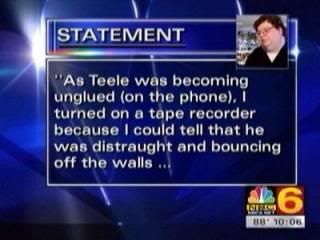
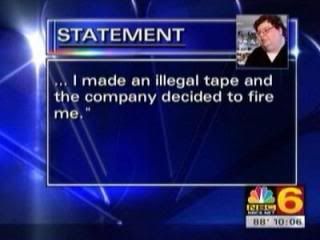
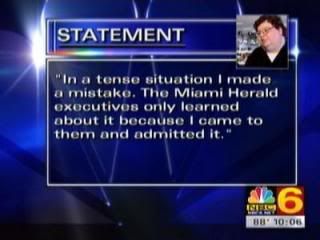
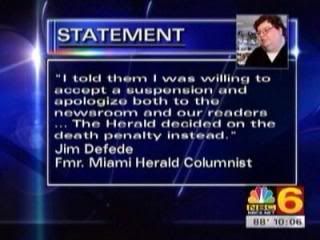

<< Home